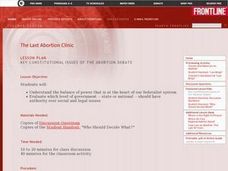College Board
Balance of Power Between Congress and the President
Three branches of government help create a system of checks and balances. A helpful resource provides a series of articles regarding the balance of power between the legislative and executive branches of government. Historians answer...
Western Justice Center
Power
A short video asks viewers to think about power in new ways. The narrator suggests that there are different types of power, 10 different sources of power. After watching the video, class members study a series of scenarios and identify...
iCivics
Branches of Power
Learners take on the roles of the legislative, judicial, and executive branches of government in the United States and work to develop public policy issues and ideas into laws in this engaging and well-designed online interactive.
Curated OER
Introduction to Age of Absolutism
Who were the absolute monarchs of Europe and what effect did they have on their countries? Young historians begin by naming qualities they believe are important for a monarch to possess. They then take notes on four key factors...
Curated OER
The Congress of Vienna
Here is a very brief look at the five great powers of Europe. The Congress of Vienna is not explained very well, but key players are introduced, as are their actions, goals, and legacy.
Curated OER
The Last Abortion Clinic: Key Constitutional Issues of the Abortion Debate
Young scholars discuss the Constitution of the United States and its amendments, then apply this discussion by creating a "Who should Decide What?" list, based upon their ideas about whether controversial issues such as abortion and...
Curated OER
Government Lesson Plan: Lesson 1
Students identify the powers of national and state governments. They evaluate the balance of national versus state power. They utilize worksheets imbedded in this plan to gain a deeper perspective of how the government powers are separated.








